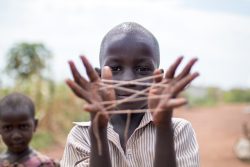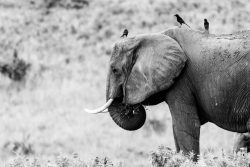Impact in the life of citizens by enhancing government accountability…
Ensuring that future funds from the industry yield as much benefit for Ugandans as possible, avoiding potential corruption and destruction of the natural environment are among the main benefits that the audit reports are probing to have.

The value for money audits (VfM /performance audits) such as waste management and local content have received great attention given the link to the discovery of oil in eco-sensitive rich areas within two national parks. Government is called up to assess the right balance between benefits from the new oil industry and

the preservation of valuable natural environments.The reports have yielded benefits such as Citizens, NGOs and CSO trust increasingly more on the way the SAI is holding the government and EI stakeholders accountable.
The audit of recoverable costs done by OAGU is similarly making an impact such as the increased revenue and social economic benefits that are seen after the SAI passed from outsourcing the services to doing it in-house. The average percentage of costs disallowed range between 16% and 5%.
Empowering local communities…

Audit reports in relation to mining has been used by government to streamline and improve the system of monitoring licensed companies(ii).
This has resulted in increased revenues from annual lease rentals/royalties that go to the local communities running artisanal mining. This will lead to better employment opportunities and higher incomes.
From outsourcing to in-house…
To be able to audit on extractive industries and expand other audit skills OAGU had to build internal competency. OAGU has made a remarkable journey in all audit streams over the last 10 years.
Nowadays the SAI counts with a team of 15-20 staff who work across the different audit disciplines. They have conducted 6 Value for Money audits (performance audit) (iii) since 2014 that have received considerable attention in the major media publications including New Vision, Daily Monitor and The East African newspapers.
The SAI has implemented a risk analysis system supported by SAI Norway. The system strengthens the selection of future auditable areas. Results within the energy sector are already perceived. Audit recommendations have led to entities putting in place measures to improve collection of government revenues, formulation of regulations and service delivery for communities e.g. rural electrification.
From receiver of support to a provider of support…
OAGU is leading the Working Group on Extractive Industries (WGEI) for SAIs and helping support other SAIs in its own region and beyond.
The group has around 40 members and since its creation it has been able to collect and provide information, previously scattered, about Extractive Industries (EI) to all its members and to the public through their website.
The WGEI has managed to increase interaction and facilitated support among its members and relevant stakeholders. The secretariat functions as a knowledge center by doing global monitoring, development of guidance, sending newsletters and delivering workshops.
OAGU has conducted a course about fiscal regimes for 12 countries. It has provided training to the WGEI members in collaboration with AFROSAI-E. Lately, OAGU has been doing peer support working closely with the SAI Kenya in legal frameworks and institutional setups for audit of EI.
But how was it before? The challenges…
Oil was discovered in 2006. OAGU envisioned the tremendous impact on the lives of citizens that the oil industry could have. The SAI then wanted to build up their competency to contribute to oil resources yielding as much benefit for Ugandans as possible. However, OAGU did not have the competency and capacity to conduct audits of the extractive industries sector. Therefore, most of the audits were previously outsourced. The energy team consisted only of two people.
To date, about 10 staff have undertaken various Master’s Degree in Oil and Gas-related topics and 2 more are currently undertaking studies. The knowledge acquired and on job training with support from SAI Norway have boosted their capacity to undertake the audits and dropped any reliance from private audit firms.
How did OAGU reach the actual level and impact? The response to the challenge…
Strong leadership, cooperation and harmonized donor support are among the key factors that has strengthen the SAI role.
Strong leadership
In 2016 OAGU used the SAI Performance Measurement Framework (SAI PMF) assessment, a tool developed by the INTOSAI Working Group on the Value and Benefits of SAIs with the financial support and global roll-out from the INTOSAI-Donor Cooperation, to analyse its strengths and weaknesses. They had support from GIZ and OAG Norway to conduct the exercise. This offered detailed information about their institutional capacity in performing audit compared to ISSAIs and best international practices, and management of its resources. The SAI PMF results together with the AFROSAI-E Institutional Capacity Building Framework results permitted to identify areas of improvement covered in the corporate strategy 2016-2021. The OAGU sought likewise input to the plan from different stakeholders, Parliament, audited entities, media and civil society. OAGU assures that support is aligned to their greatest need.
Harmonized donor support
OAGU has received steady long-term support from SAI Norway since 2012 to strengthen capacity in audit of EI, including support in conducting VfM audits.
 SAI Sweden has supported OAGU since 2013 in strengthening the VfM function, both in terms of strategy and methodology. In addition, SAI Sweden has cooperated in internal and external communication (including media training) and strengthening of the quality assurance function. SAI Sweden´s cooperation has similarly contributed to strengthen capacity within financial/regularity audit, management development and records and archives.
SAI Sweden has supported OAGU since 2013 in strengthening the VfM function, both in terms of strategy and methodology. In addition, SAI Sweden has cooperated in internal and external communication (including media training) and strengthening of the quality assurance function. SAI Sweden´s cooperation has similarly contributed to strengthen capacity within financial/regularity audit, management development and records and archives.
Furthermore, the support provided by OAGN has enhanced the relationship between OAGU and the Parliament. OAGU is also counting on the support of the Norwegian embassy and NORAD through the Oil for Development programme. This contributed to OAGU being able to raise awareness of their reports thanks to the press conferences.
Cooperation
OAGU is currently working on a new strategy for the energy sector that includes an overview of the challenges in the sector in the years to come. The strategy was developed in partnership between GIZ, WGEI and SAI Norway.
GIZ has supported OAGU in different areas, for instance with the formation of the INTOSAI Working Group for Extractive Industries (WGEI), development and implementation of the stakeholder engagement strategy and planning the corporate strategy 2016-2021. The strategy intends to achieve more robust reporting and high-quality audit – targeting service delivery achieved through professional approaches and systems.
In 2012 OAGU established a Coordination Unit to manage and coordinate external support. The unit has an overview of all the development projects that support the OAGU, which is shared with the development partners. This single focal point for donors has resulted in increased, and more efficient communication between the OAGU and its development partners. It has also made it easier for the OAGU to take an active role towards their development partners to prevent any risk of overlap and duplication of support. It harmonises and prioritises the needs of the SAI for external support, provides assurance to development partners on the use of resources as per agreed terms, and ensures that the independence of the SAI is not compromised as required by INTOSAI guidelines.
All this would have not been possible without …
✔ Strong SAI leadership managing its own support
✔ Alignment of support behind the SAI strategic plans
✔ Coordinated and scaled-up support
…which are the MoU principles of the INTOSAI-Donor Cooperation
But the story does not end there. The OAGU still has challenges to overcome…OAGU still continues to develop and improve relationships with its main stakeholders. The Parliament struggles with a big backlog of performance reports that have been submitted(iv). Audit recommendations are not followed-up. There has been no completed scrutiny of audit reports for the last 3 financial years according to PEFA 2017.
In addition, OAGU recognizes the continued need to strengthen coordination among donors by instating policy guidelines of dealing with the development partners, increasing transparency and safeguarding the SAI’s independence.
“We have chosen to lead our development and contribute strategically towards the future of our nation and the Ugandan people. In this sense we value the sustained support given by our development partners and harmonization of their programs with our strategic plans. There is no limitation as to how much an SAI can contribute towards the live of the citizens” – Mr. John F.S. Muwanga, Uganda Auditor General
The story in other languages:
The INTOSAI-Donor Cooperation is a strategic partnership between donors and the Supreme Audit Institution (SAI) community.
Purpose: to improve SAI performance in developing countries through scaled-up and more effective support.
Guiding Principles: development of country-led strategic plans; donors respecting SAI country leadership; and improved coordination of support.
Members: To date, 23 donor organizations and INTOSAI
(who comprise the INTOSAI-Donor Steering Committee) have signed the Memorandum of Understanding.
For more information, visit us online at www.intosaidonor.org.